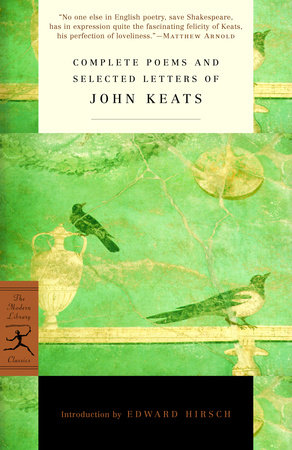Complete Poems and Selected Letters of John Keats Reader’s Guide
By John Keats


1. Compare the speakers of "Ode on a Grecian Urn" and "Ode to a Nightingale." How would you describe each speaker’s state of mind? In both poems, something exterior to the speaker serves as a catalyst for a vision. What is the vision that each speaker experiences? Are these visions compatible or competing? Discuss why it might be significant that "Ode on a Grecian Urn" ends with a statement while "Ode to a Nightingale" ends with a question.
2. Consider the role of the human senses in Keats’s poems. Compare two or more poems that invoke the senses (such as "Ode to a Nightingale" or "The Eve of St. Agnes"). Why are the senses important? Do the poems value certain senses more than others? What is the relationship between the senses and poetic imagination/poetic insight that each of these poems offers?
3. Discuss the role of female figures in Keats’s poems. Examine poems such as "The Eve of St. Agnes," and "La Belle Dame sans Merci." How are female figures used in each?
4. Consider Keats’s letters as a statement of poetics. Discuss, in particular, Keats’s letter to Richard Woodhouse, in which he claims, "A Poet is the most unpoetical of any thing in existence, because he has no Identity." What does he mean by this? What does he imagine is the poet’s function in society-interpreter? creator? visionary? What, according to Keats, motivates the poet to write? Discuss his claim that, "I feel assured I should write from the mere yearning and fondness I have for the Beautiful even if my night’s labours should be burnt every morning and no eye ever shine upon them."
5. Discuss Keats’s definition of "Negative Capability" in his letter to George and Thomas Keats. What is Negative Capability, and who, according to Keats, possesses it? How might Negative Capability be related to his notion that the poet "has no identity"?
6. Keats’s first collection of poems, published in 1817, received a barrage of negative criticism from Tory politicians. Examine John Wilson Croker’s and John Gibson Lockhart’s critiques of Keats’s poems. What, specifically, do they find so offensive about Keats’s language? What do they think is the appropriate language for poetry? In what ways does Keats’s assertion that "with a great poet the sense of Beauty overcomes every other consideration, or rather obliterates all consideration" threaten Croker’s and Lockhart’s assumptions about poetry?
Just for joining you’ll get personalized recommendations on your dashboard daily and features only for members.
Find Out More Join Now Sign In